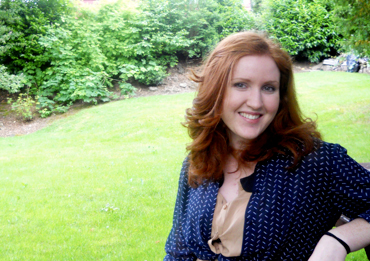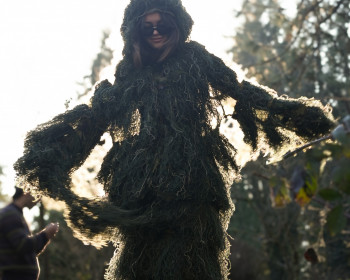Summer research students investigate neuron development in zebrafish
Open gallery

At Lewis & Clark, summer doesn’t necessarily mean vacation. Many students spend up to 40 hours a week doing collaborative research with faculty each summer.
Kyla Hamling ’14, Ian Lake ’13, Derek Warner-Reyes ’15, and Leah Weston ’13 are working alongside Assistant Professor of Biology Tamily Weissman-Unni to investigate the neural circuitry of the zebrafish to better understand the brain. In this Q&A, Hamling reflects on the value of these experiences.
What are you researching this summer?
Our lab is researching the development of neural circuitry in the zebrafish, focusing on the development of neurons in the cerebellum. Using Brainbow, a DNA construct that allows each labeled neuron to express a unique fluorescent color, we can watch the neurons under a microscope as they grow and develop. Our research in the cerebellum will hopefully lead to a better understanding of how more complex neural circuits in other parts of the brain develop, which is currently poorly understood.
How do you think student-faculty collaboration has impacted your education?
My collaboration this summer with Tamily has been as important as, if not more important than, the experiences I have had in any of my classes thus far. Scientists are really born and bred in the lab, so your success there can really make or break you. Having a great mentor is critical to that success. Tamily goes to great lengths to make sure each student gets a meaningful experience in her lab. So much of becoming a good scientist is simply diving in and doing real science.
How do you hope your experiences this summer will impact your future studies or professional pursuits?
I hope that my hands-on experience in the lab will be a valuable experience for my future career as a research scientist. The topic of my research project this summer is exactly what I’m so excited to pursue in my career, and I hope that having relevant experience so early in my life will only help prepare me for my professional life after Lewis & Clark. Coming to work this summer, I realize how much I love facing new challenges every day and having to continuously put my scientific knowledge to the test to ultimately answer a much bigger question.
How did you decide to attend Lewis & Clark?
I knew I preferred the feel of a smaller school to a large state school atmosphere. I liked the idea of getting to know my professors and being able to develop close relationships with them, rather than just being a face in the crowd. At Lewis & Clark I’ve always felt that professors are here first and foremost because they love teaching and they wholeheartedly support their students in all their endeavors. That supportive environment from faculty and fellow students was really what drew me to Lewis & Clark.
About the program
The John S. Rogers Science Research Program allows students to participate in graduate-level research with an emphasis on strengthening their communication skills by requiring them to present their findings. This summer, 40 students are pursuing topics that range from cybersecurity to spider venom, and zebrafish to magnetic fields. Working closely with peers and faculty members, students undertake research questions and present their work in two public venues.
“We’re not asking you anymore, ‘What’s the answer,’ we’re saying ‘What’s the question,” said Michael Broide, director of the Rogers Program and chair of the physics department. “I think what sets our program apart is that regardless of what project you are on, we’re all going to come together as a group to present what we’re doing in as accessible a way as possible. In science, it’s such an important skill to be able to explain cogently what you’re doing.”
Students make their final research presentation at the Rogers Summer Science Poster session, held in conjunction with the Science Without Limits Symposium. Scheduled for September 18, the poster session is free and open to the public.
Zibby Pillote ’14 contributed to this story.
Opportunities in Science at Lewis & Clark
Read more about current research projects:
More Newsroom Stories
Public Relations is located in McAfee on the Undergraduate Campus.
MSC: 19
email public@lclark.edu
voice 503-768-7970
Public Relations
Lewis & Clark
615 S. Palatine Hill Road MSC 19
Portland OR 97219

